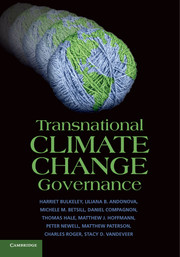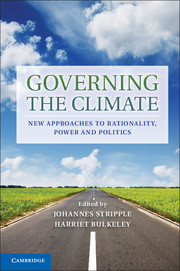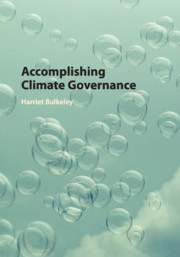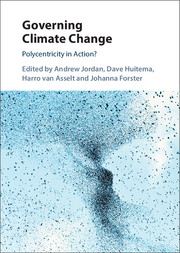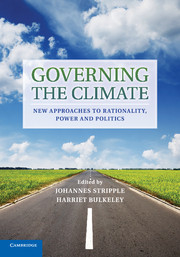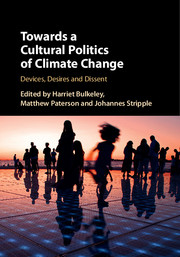Transnational Climate Change Governance
The world of climate politics is increasingly no longer confined to the activities of national governments and international negotiations. Critical to this transformation of the politics of climate change has been the emergence of new forms of transnational governance that cut across traditional state-based jurisdictions and operate across public and private divides. This book provides the first comprehensive, cutting-edge account of the world of transnational climate change governance. Co-authored by a team of the world's leading experts in the field and based on a survey of sixty case studies, the book traces the emergence, nature and consequences of this phenomenon, and assesses the implications for the field of global environmental politics. It will prove invaluable for researchers, graduate students and policy makers in climate change, political science, international relations, human geography, sociology and ecological economics.
- Provides the first comprehensive account of transnational climate change governance
- Offers three different conceptual lenses through which to examine these issues
- Will appeal to those seeking to understand the potential and limits of alternative responses to climate change
Reviews & endorsements
'International climate policy is desperately in need of a serious re-boot, but can the agents of transnational governance step in and take up some of the slack? For Harriet Bulkeley and her team of experts, their activities offer a window into a complex and fascinating netherworld in which critical issues of authority, legitimacy and effectiveness are continually worked through. This is imaginative and reflexive environmental social science at its best.' Andrew Jordan, Tyndall Centre for Climate Change, University of East Anglia
'… provides essential lessons for all those who are looking to find solutions to the current climate crisis. This is a must-read for anyone who is involved in so-called bottom-up climate change initiatives and, in fact, for anyone who is interested in finding workable solutions to the climate crisis.' Mark Kenber, CEO, The Climate Group
'… an ambitious work at the cutting edge of scholarship on global governance. … brings together some of the most well-known scholars of environmental governance … This volume is powerful conceptually and empirically, and is essential reading for anyone interested in understanding the changing nature of governance at the global level.' Virginia Haufler, University of Maryland
'This excellent volume offers the first comprehensive assessment of the countless transnational initiatives that have emerged in recent years in climate change governance. The author team of ten prominent scholars in the field has intensively collaborated over several years in scrutinizing a large dataset of sixty transnational climate governance initiatives from three major theoretical perspectives. In an area that has drawn so far largely on single case studies or smaller comparisons, Transnational Climate Change Governance now finally takes the debate a fundamental step forward. This crucial and timely volume is a must-read for all those interested in climate governance.' Frank Bierman, Vrije Universiteit, Amsterdam, Lunds Universitet, Sweden, and Chair, Earth System Governance Project
Product details
February 2018Paperback
9781107676312
224 pages
255 × 180 × 15 mm
0.45kg
30 b/w illus. 4 tables
Available
Table of Contents
- 1. Introducing transnational climate change governance
- 2. Mapping the world of transnational climate change governance
- 3. Theoretical perspectives on transnational governance
- 4. Origins, agency and the forms of transnational climate change governance
- 5. Constructing transnational climate change governance issues and producing governance spaces
- 6. The uneven geography of transnational climate change governance
- 7. Understanding authority and legitimacy in transnational climate change governance
- 8. Making a difference? Tracing the effects and effectiveness of transnational climate change governance
- 9. Conclusions - looking beyond transnational climate governance.

